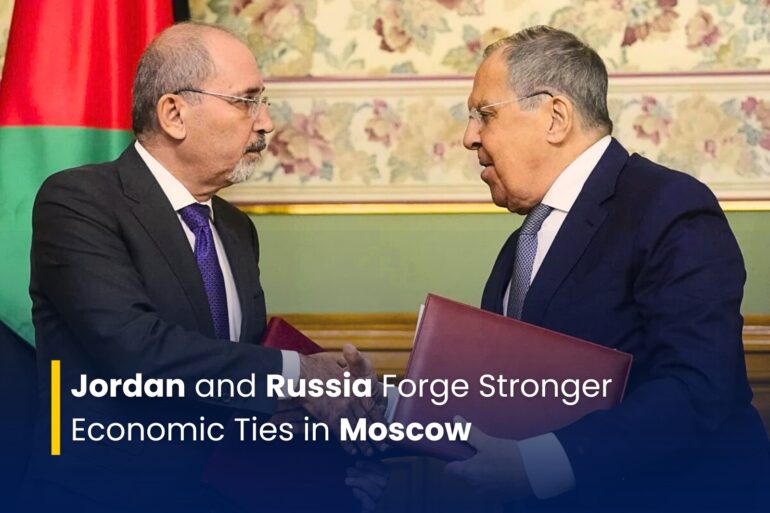In a significant diplomatic development this August, Jordanian Deputy Prime Minister and Foreign Minister Ayman Safadi met with Russian Foreign Minister Sergey Lavrov in Moscow, underscoring both countries’ commitment to enhancing economic, cultural, and strategic cooperation. Here’s a breakdown of the key highlights from their talks, as featured in the blog-styled recap of the event.
Main Highlights from the Talks
1. Visa-Free Travel Agreement
A major outcome of the meeting was the signing of a mutual visa waiver agreement, allowing nationals of both nations to travel visa-free for stays of up to 30 days per trip, with a maximum of 90 days per year. This move is expected to catalyze tourism, business travel, and cultural exchanges.
2. Joint Committee & Multi-Sector Cooperation
Preparations are underway for the seventh session of the Jordanian–Russian Joint Committee on Trade, Economic, Scientific and Technical Cooperation, set to convene later this year in Moscow. The agenda spans a broad spectrum—trade, education, tourism, cultural exchange, and even religious tourism.
More than 1,500 Jordanian students are currently studying in Russia, while Russia continues to encourage visits from Orthodox pilgrims to Jordan’s holy sites.
3. Agricultural Collaboration
Earlier in 2025, Jordan’s Agriculture Minister Khaled Hneifat met with Russia’s Deputy Agriculture Minister to discuss strengthening agricultural trade. Key topics included:
- Lifting customs and tax barriers.
- Expanding the variety of Jordanian agricultural exports to Russia.
- Activating technical and scientific cooperation to improve production efficiency and sustainability.
4. Economic Integration into Eurasian Markets
The discussions included leveraging the Eurasian Economic Union (EAEU) as a platform to access wider markets. Jordan and Russia explored how the Aqaba Port could serve as a regional gateway for Russian goods into African and Middle Eastern markets.
5. Diplomatic Alignment on Regional Affairs
Both ministers emphasized their alignment on critical regional issues—including Gaza, Palestine, Syria, and the broader Middle East peace process. They echoed calls for a comprehensive ceasefire in Gaza, humanitarian aid delivery, prisoner exchanges, and international recognition of a Palestinian state, aligning with UN resolutions and the Arab Peace Initiative.
Strategic Implications
| Sector | Opportunity / Impact |
|---|---|
| Tourism & Culture | Visa-free access fuels tourism, pilgrimages, student mobility. |
| Trade & Agriculture | Enhanced exports, streamlined customs, and joint technical efforts to modernize agriculture. |
| Regional Security | Economic ties reinforce diplomatic alignment on peace, stability, and multilateral cooperation. |
| Market Integration | Entry into Eurasian markets via Aqaba increases Jordan’s regional connectivity. |
Why This Matters
- Economic Diversification: For Jordan—challenged by resource limitations and rising debt—expanding trade and investment avenues is crucial for sustainable growth.
- Russia’s Strategic Pivot: Amid economic pressures, Russia seeks reliable partners in the MENA region for investment and growth. Jordan’s broadening engagement offers Russia a foothold in trade, tourism, and political influence.
- Regional Role of Jordan: Historically seen as a moderating force, Jordan’s enhanced cooperation with Russia bolsters its diplomatic agility across global power arenas.
Looking Ahead
- Upcoming Committee Session: The seventh Joint Committee meeting promises to translate strategic goals into tangible projects—be it in logistics, education, trade, or tourism.
- Visa-Free Benefits: Expect upticks in tourism, cultural exchanges, and business visits between the two countries.
- Agricultural Initiatives: Should customs reforms and export agreements materialize, Jordanian agriculture could see new markets in Russia and beyond.
- Broader Diplomacy: Shared regional stances, especially on Gaza and Syria, may reinforce Jordan’s role as a regional peace advocate.
In sum, the Jordan–Russia dialogue in Moscow reflects a deepening partnership—spanning travel, economic cooperation, education, agriculture, and regional diplomacy. It stands as a prime example of how nations can mutually reinforce strategic, economic, and cultural ties in today’s complex geopolitical landscape.

